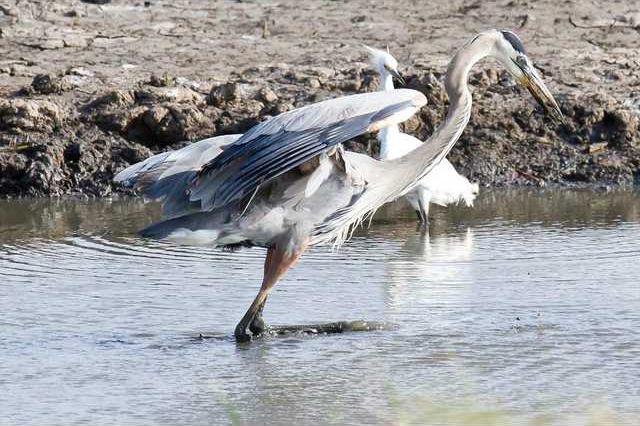Times are tough and exuberant in the marsh these days. For the fish and crustaceans that require water-- it is a critical time and many will perish. There is essentially no water in 85-90% of the Cheyenne Bottoms. Huge numbers of birds have moved on north-- either due to their migration instincts, or by the necessity to find food. For the shore birds, gulls, herons, Ibis, avocets and black-necked stilts and some of the ducks-- it is a feast of gigantic proportions.
The shrinking water congregates the bait fish and crayfish into scrumptious, well-contained meals for these birds. It is actually a great time to watch the birds interact and squabble over territory, food and space. It is unusual to see several species in such small spaces-- we are accustomed to seeing vast expanses of water with fairly well-separated similar groups of birds with lots of space in between. Now the puddles are separated by large mud flats that are drying so quickly that we even see dust clouds and dirt devils in the middle of the marsh. The carp swimming with their backs out of the water is just one of the very visible ways that mother nature exhibits her strength and terror in hard times during drought in the marsh. As we are all aware, the wind has been rather relentless over the past 10 days. Harvest is occurring so very early this year.
A small group of whooping cranes wintered in Kansas this year for the first time on record. We have had a early white bass run, a early walleye spawn, and a early crappie spawn. If the weather truly is changing, we will see the wildlife adapt to maximize their breeding and survival opportunities.
It will be a process that KWEC and the other academic people will study and document very precisely. Our birders and hunters will be on high alert as we watch the marsh and the climate impact on our feathered and furry friends. It is a special time in the marsh-- hopefully we won’t see it like this very often- but this view is pristine and special. Enjoy!
Doc Witt is a retired urologist and Eric Giesing is a biologist.
MARSH MUSINGS
DR. DAN WITT and ERIC GIESING





